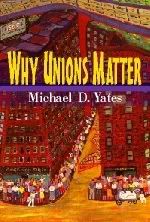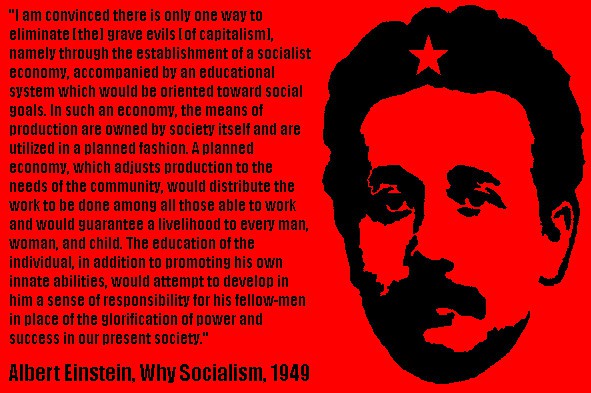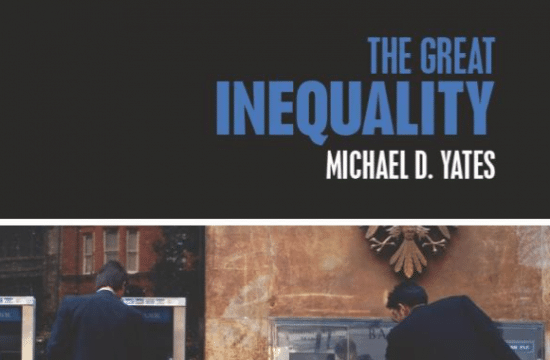Note: Parts of this are taken from the new edition of my book, Why Unions Matter, which will be published by Monthly Review Press next month.

Labor unions have been on the ropes in the United States for many years. In 2007, union density (the share of employed workers in unions) was around 12 percent; density has been declining since the mid-1950s, when it was more than 30 percent, and especially since 1980, when it was about 20 percent. There are fewer union members today than there were in 1995. The private sector has so hemorrhaged union members that union density there is now about 7.5 percent, below what it was before the Great Depression. A few unions, most notably the Service Employees International Union (SEIU), have grown, but, in the case of SEIU, there is considerable controversy over the manner in which the union has gained new members, with critics arguing that its often top-down growth has not strengthened the labor movement.
To be successful, unions must not only organize workplaces; they must also have a strong political voice. Organized labor in the United States has never had the formidable political presence workers’ organizations have in other parts of the world. However, there have been times when labor wielded some political clout, such as the period from the mid-1930s to the early 1970s. Over the past thirty-five years, however, labor has been politically voiceless. The AFL-CIO and its member unions have spent hundreds of millions of dollars trying to get sympathetic politicians elected to office, and with some success. Yet this has not translated into legislation that empowers working men and women. Except for a couple of badly needed increases in the minimum wage, quite the opposite has occurred. Whether the President has been Democrat or Republican, labor has gotten the short end of the stick: “free trade” agreements, an end to most federal aid to the poor, worsening health care, more working class people in prison, the refusal to enforce the nation’s labor laws, and endless wars that have drained public coffers of funds that might have been used to enhance the lives of ordinary folks. And as critic of the labor movement Kim Moody points out, there is a direct correspondence between the increase in the amounts of money and effort labor has expended politically and the decline in organizing efforts. That is, during every political season organized labor goes into high gear for the Democrats, pouring money into political coffers and its own more generic pro-Democrat campaigns and devoting tens fo thousands of volunteer hours to phone banking, leafleting, and house visits. But while unions are doing these things, organizing campaigns are put on hold or never begun, so that the one thing that would make politicians heed labor’s desires, namely mass organization of workplaces, does not occur.
This time around, the two union federations, the AFL-CIO and Change to Win (CTW), pulled out all the stops to help elect Barrack Obama. The AFL-CIO, the CTW, and member unions together poured more than one hundred million dollars into the presidential campaign of Barack Obama and millions more into efforts to get Democratic Senators and Representatives elected. One important reason for this support is that Obama and many Democratic politicians are on record in favor of passage by Congress of the Employee Free Choice Act (EFCA). This act, which most of organized labor believes critical to union survival, would amend the National Labor Relations Act (NLRA) in several important respects:
* It would compel employers to recognize a union if a majority of the members of the bargaining unit sign union authorization cards (called card check recognition). Some unions have won through negotiations with an employer in one location a commitment from that employer to recognize the union in another place on the basis of a card check. However, no employer is bound to agree to such a thing, and the George W. Bush appointees who control the National Labor Relations Board (NLRB) have ruled that if the NLRB certifies a union on the bases of card check, workers in the unit have forty-five days to petition for a secret-ballot decertification election, which can be triggered if 30 percent of the unit sign a decertification petition or card. The EFCA would overturn the NLRB decision and, given that employers routinely, grossly, and successfully violate the labor laws in organizing campaigns that end in a certification election, make it easier for unions to organize employees.
* Employers could be ordered to pay “treble damages” to workers illegally fired for engaging in activities protected by the NLRA.
* Employers deemed to be repeat labor law offenders could be made to pay a $20,000 fine in addition to other penalties.
* To avoid the long, drawn-out, and often futile bargaining for a first agreement, a union (or an employer) could invoke binding interest arbitration. An arbitrator would then, after a hearing, establish the terms of the first collective bargaining agreement, and these would be in effect for two years, after which traditional bargaining would take place.
Obama said this about the Act while campaigning in Ohio during the Democratic primary:
If a majority of workers want a union, they should get a union. It’s that simple. We need to stand up to the business lobby and pass the Employee Free Choice Act. That’s why I’ve been fighting for it in the Senate and that’s why I’ll make it the law of the land when I’m president of the United States.
Unions poured money into the campaigns of EFCA-friendly politicians and have been sending members around the country to bear witness to the need for the new law. Labor is also tying labor law reform and the EFCA to national economic problems. Economist Dean Baker said that
While suppression of workers’ right to organize may appear to have little direct relationship to the collapsing housing bubble that is the cause of this recession, on closer examination they are closely linked . . . . If workers are able to form unions and get their share of productivity growth, it an again put the country on the path of wage-driven consumption growth, instead of growth driven by unsustainable borrowing . . . . Restoring a wage-driven growth path will provide workers and businesses with much more stability than the current bubble economy.
Not surprisingly, corporate America is spending gobs of money opposing the EFCA and preparing to lobby hard against it. The Act made it through the House of Representatives in 2007, but it never got to a Senate vote and there were then not enough votes to overcome a certain Bush veto in any case. But the Democratic sweep in 2008 could make passage much more likely.
There is no doubt that the EFCA would benefit workers. But there is reason to be skeptical about its passage. Past efforts at labor law reform failed even when, as now, Congress and the White House were controlled by Democrats. How short of mass mobilization of workers will skittish politicians vote for the EFCA in the face of massive business lobbying? The Fox television network has been railing against the EFCA ever since it began to appear likely that Obama would win the election. Like the corporate spokespersons and politicians who oppose it, Fox has cleverly argued against EFCA in terms of the right of workers to have free elections. No mention is ever made of the sham that union certification elections have become. During the election campaign period that follows a union’s petition to the NLRB for an election, most employers vigorously and brazenly violate the NLRB’s prohibitions against employer interference with the rights of workers guaranteed by the NLRA. Unions supporters are fired, harassed, intimidated, demoted, and denied promotions. The law itself has been interpreted by employer-friendly NLRB members and courts to deny union organizers the right to be on company property to meet with employees and to give employers the right to force workers to attend anti-union meetings. The penalties levied by the NLRB when employers violate the law are so minimal that companies nearly always find it worthwhile to disobey the law and take the punishment meted out by the Board. They know that their illegal actions will intimidate their employees and make it very difficult for the union to prevail in an election.
Will a Democratic president make the EFCA a priority when there will be so many excuses not to? Obama has already shown his disdain for labor when he failed to appoint a single labor representative to his economic transition team. Such a person might have made the argument that economic recovery is unlikely to happen so long as the distribution of income, which has been getting more skewed toward the rich nearly every year for three decades, does not become more equal and so long as wages fail to rise at least as much as worker productivity increases. Obama did appoint a supporter of workers to be his Secretary of Labor. But when nominee Hilda Solis appeared before the Senate to be confirmed, she dodged a question about the EFCA. She could have used this opportunity to educate the senators about how union certification elections really work and why EFCA is needed. She could have said that the right of an employer to compel employees to attend “captive audience” anti-union meetings would be akin to one political party being granted the right to make us all attend meetings in which its leaders denounced the other party. And if the other party wanted to have a rally, it would have to hold it in another country. If Obama’s allegedly pro-labor Secretary of Labor couldn’t even put the EFCA in a favorable light, why would anyone think that Obama will go out of his way to get the Act passed?
Finally, how, given the top-down nature of so many unions, will the workers be mobilized? Unions appear to be almost as afraid of their own members as they are of employers. If the United Auto Workers won’t lead mass demonstrations of its members against the concessions that are being jammed down their throats in the aftermath of GM and Ford going hat-in-hand to Congress asking fo bailout money, why should we believe that unions will come close to matching the anti-EFCA efforts of employers and their allies in the media and in Congress. Right now the leader of CTW, Andy Stern, is up to his neck in corruption scandals within his union, SEIU. The head of the AFL-CIO is the superannuated John Sweeney, who is not likely to ever again energize workers about anything. I don’t think it would be that hard to get workers into the streets to fight for the EFCA and many other things as well. The members of the United Electrical Workers union— one of the few rank-and-file unions left in the United States—who recently occupied their factory in Chicago and forced the employer to pay them wages due showed that workers will take action when the cause is just and the leadership isn’t urging restraint.
Here is good question: if the EFCA becomes law, how will it change things? What does it do to guarantee the rank-and-file organizing campaigns that alone ensure long-term union survival. Even if a union is certified on the basis of card check and even if an arbitrator gives the parties a two-year agreement, what ensures that the union will be able to negotiate on its own after the first contract expires?
A few labor scholars and activists argue that the entire EFCA strategy is flawed. It represents one more piecemeal attempt to change the law, each attempt unconnected to the last and unconnected to a coherent long-term strategy to rebuild the labor movement. These critics point out that “free choice” is not the central issue for workers. Instead they say that labor needs to embark upon a full-fledged “rights” campaign, modeled on the great civil rights and labor movements of the past. This must involve three practices: a long-term struggle for fundamental principles, the promotion of principles that are really fundamental (such as full freedom of association and an unrestricted right to strike and show solidarity with other workers by any nonviolent means. Any restrictions on these amount to involuntary servitude.), and reliance on rank-and-file activity (including civil disobedience any time fundamental principles are restricted). History teaches us that revolutionary changes in rights occur only when mass mobilization of ordinary people, led by men and women who refuse to compromise, forces the powers that be to respect them. For changes in labor law to effect progress for workers, organization must precede not follow them.








Myth vs. Reality: The REALITY is the Employee Free Choice Act Helps American Workers and their Families.
As more and more working Americans struggle to make ends meet, the ability to form a union is key to the economic stability, health, and well-being of American families. Union workers’ median weekly earnings are 30 percent higher than those of non-union workers, union workers are 63 percent more likely to have employer-sponsored health insurance, and union workers are 77 percent more likely to have short-term disability benefits. According to a recent poll, nearly 60 percent of Americans would join a union if they could. (AFL-CIO, “The Union Difference: Union Advantage by the Numbers.”)
For More Information on EFCA please visit our website and blog
http://www.employeefreechoiceactnow.org
The study”Global War on LIberty”, by Jean-Claude Paye, held back from publication by this administration until late in 2008, having been published in Paris in french on 2004, is a quiet bombshell of clear information about the total change in US national and international law. The United States will, in time, destroy all it’s unions and will intimidate other countries to do the same. Right now the massacre in Gaza, long planned, carefully placed before Bush/Cheney are gone, is the beginning move of Empire of the anticipatory U.S. World War Policeman.
As Senator Giamo told us peace women , a million in 1981,marching on Washington to be empowered as having rights under the Constitution: ” You liberals are too disjointed! We have been organized for forty years. We pay no attention to those who march here, none! You are a joke to us!”
Please read the book. It has never been advertised and all available books, new, are sidelined as if second hand. Only two left. From 44 euros to 114 euros apiece.
Vital information.
Suzanne de Kuyper
Amsterdam
One of the problems of the Employee Free Choice Act is the name itself. Corporations are responding by talking about the secret ballot and intimidation as true freedom of choice. Of course we know that they have abused the current system with lots of intimidation, which is what the EFCA is out to change.
I think that rather than Free Choiice, the unions should be talking about economic justice and the growing divide between rich and poor that unions can help redress.
Perhaps the act should be called the “Level the Playing Field Act” or the Economic Justice for All Act? Something along those lines.
I agree that given the massive funding of the anti-EFCA campaign by corporations, the Democrats are likely to fold. Thanks for this analysis Michael..
Jon Flanders
Unions were formed at a time when business was expanding. Since the 1970’s when manufacturing started its decline in the United States, unions have been falling apart. Why do you emphasize the need for politicians to do more for unions? Perhaps unions do not have any support from the workers who, while earning a smaller wage, are earning a wage that sustains a decent way of life, and not a fat cat wad of money to be spent on frivolous items.
Would an automobile worker rather be working for Honda in Marysville OH, or for General Motors?
Most white collar jobs exist without a union. They have healthcare, they pay $200 to $300 monthly premiums for this benefit. Would it be too much to ask a retired autoworker to self-pay for healthcare benefits the same as the rest of the retired workforce.
Were unions the scapegoat for the autmobile corporations to find blame in their demise? Yes of course. Domestic automobile companies are very short sighted. But fuel efficiency standards have led to creating a lean and mean automobile industry. Yes it would of helped. But not without labor also sacrificing. 25,000 dollars per year is more than enough money to do repetitive manual labor work 8 hours a day, with 2 breaks a day and a bonus during good times. In hindsight the bonuses should of been held from labor and put into R&D, and the leftover income of the laborers should of been put into the nest egg.. Corporate taxes can redistribute monies to the poor much better than an auto worker deciding to purchase a speed boat.
I meant to say tougher fuel efficiency standards would have led to creating a lean and mean automobile industry. An old arguement that weak politicians could not muster courage to enforce since the 1973 Oil embargo